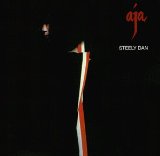Pristine. That may be the only way to describe the sound quality of Steely Dan’s Aja. When you consider that the album was released 32 years ago today, it says a lot for what was achieved.
 I know Steely Dan gets a lot of disrespect from some quarters. Their music — at least their last four albums in the 1970s — is viewed by some as a prime example of studio soullessness. Others lay at their feet importing smooth jazz into rock. And while those claims could be made about this album, it’s still difficult to find as excellent a combination of rock, pop and jazz. The latter element isn’t surprising. After all, the title cut features not only Steve Gadd, who’s played drums with artists like Chick Corea, but also sax player Wayne Shorter, a jazz giant.
I know Steely Dan gets a lot of disrespect from some quarters. Their music — at least their last four albums in the 1970s — is viewed by some as a prime example of studio soullessness. Others lay at their feet importing smooth jazz into rock. And while those claims could be made about this album, it’s still difficult to find as excellent a combination of rock, pop and jazz. The latter element isn’t surprising. After all, the title cut features not only Steve Gadd, who’s played drums with artists like Chick Corea, but also sax player Wayne Shorter, a jazz giant.
True, Steely Dan wasn’t really a band after 1974. That year the touring unit broke up and founders Donald Fagen and Walter Becker retreated to the studio and, as they put it, the band was “reborn as a strictly-studio unit.” Steely Dan’s last four albums of the 1970s — Katy Lied, The Royal Scam, Aja and Gaucho — were all cut with session musicians and guests. But what an array of session players — Gadd, Jim Horn, Jim Keltner, David Sanborn, Tom Scott, Michael Brecker, Larry Carlton, Michael McDonald (who’d been a member of the band when it quit touring). To some, these were just soft jazz or pop lightweights and the music was equivalent to the duo engaging in soundboard masturbation. Yet those criticisms ignore not only the complexity of the music but also the fact people like Shorter and sax player Phil Woods were part of the effort and many of these musicians — Gadd, Keltner, Brecker and the like — were simply top-notch.
Aja may be the epitome of the Fagen-Becker/Steely Dan studio experience. Counting singers, roughly three dozen different musicians appear on the album in addition to Fagen and Becker. While the lyrics don’t have quite the level of arcane imagery found in much of the pair’s song catalog, the arrangements and changes in meter are often unusual, even complex. The performances approach perfection. Granted, you can hear some smooth jazz in the presentation and, as a result, I would call this more jazz-pop than jazz-rock. But the sound. The sound will never cease to amaze. Particularly if you listen with headphones, each note sounds as if it were precisely placed at its particular location in the layers and mix. These are not jigsaw pieces being slapped into place. They are closer to atoms forming matter with each selected according to a specific recipe.
I’m not the only one dazzled by the sound. As Barry Walters wrote in Rolling Stone in 2001, this is an album with “surreal sonic perfection, [and] melodic and harmonic complexity — music so technically demanding its creators had to call in A-list session players to realize the sounds they heard in their heads but could not play, even on the instruments they had mastered.” Two years later, when the magazine named it the 145th album on its list of the 500 Greatest Albums of All Time, it said, “If you were an audiophile in the late Seventies, you owned Aja.” Even the professionals were impressed, as the album won the 1977 Grammy Award for Best Engineered Recording (non-classical).
Still, regardless of the quality, that sound wouldn’t really mean much if Aja weren’t listened to. It certainly met that test. The album went gold (500,000 copies sold) less than two weeks after its release and was certified platinum (1 million copies sold) before the year was out. It was nominated for the Grammy for Album of the Year (losing to Hotel California). While Aja reached number three on the Billboard charts, two songs from it — “Peg” and “Deacon Blues” — hit the top 20 on the singles charts at number 11 and number 19 respectively, while “Josie” would reach number 26 on the top 40 charts. And while those songs hit the charts, you can’t claim that “Black Cow,” which opens the album, or the eight minute title cut are weaker tunes by any means.
All the haters out there can continue to diss the band. I, for one, will continue to marvel at this sonic gem whenever I hear it.
I cried when I wrote this song
Sue me if I play too long
This brother is free
I’ll be what I want to be
“Deacon Blues,” Steely Dan, Aja







